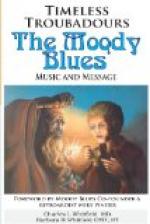Secondly, it has been felt that some explanation is required to account for the extreme complexity and artificiality of troubadour poetry in its most highly developed stage. Some nine hundred different forms of stanza [8] construction are to be found in the body of troubadour poetry,[5] and few, if any schools of lyric poetry in the world, can show a higher degree of technical perfection in point of metrical diversity, complex stanza construction and accuracy in the use of rime. This result has been ascribed to Arabic influence during the eighth century; but no sufficient proof has ever been produced that the complexities of Arabic and Provencal poetry have sufficient in common to make this hypothesis anything more than an ingenious conjecture.
One important fact stands in contradiction to these theories. All indications go to prove that the origin of troubadour poetry can be definitely localised in a particular part of Southern France. We have seen that the Limousin dialect became the basis of the literary language, and that the first troubadour known to us belonged to Poitou. It is also apparent that in the Poitou district, upon the border line of the French and Provencal languages, popular songs existed and were current among the country people; these were songs in honour of spring, pastorals or dialogues between a knight and a shepherdess (our “Where are you going, my pretty maid?” is of the same type), albas or dawn songs which represent a friend as watching near the meeting-place of a lover and his lady and giving him due warning of the approach of dawn or [9] of any other danger; there are also ballatas or dance songs of an obviously popular type.[6] Whatever influence may have been exercised by the Latin poetry of the decadence or by Arab poetry, it is in these popular and native productions that we must look for the origins of the troubadour lyrics. This popular poetry with its simple themes and homely treatment of them is to be found in many countries, and diversity of race is often no bar to strange coincidence in the matter of this poetry. It is thus useless to attempt to fix any date for the beginnings of troubadour poetry; its primitive form doubtless existed as soon as the language was sufficiently advanced to become a medium of poetical expression.
Some of these popular themes were retained by the troubadours, the alba and pastorela for instance, and were often treated by them in a direct and simple manner. The Gascon troubadour Cercamon is said to have composed pastorals in “the old style.” But in general, between troubadour poetry and the popular poetry of folk-lore, a great gulf is fixed, the gulf of artificiality. The very name “troubadour” points to this characteristic. Trobador is the oblique case of the nominative trobaire, a substantive from the verb trobar, in modern French trouver. The Northern French trouvere is a nominative




